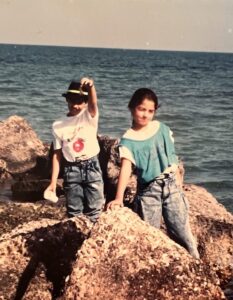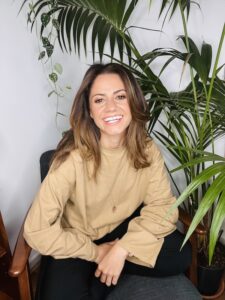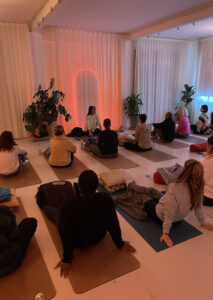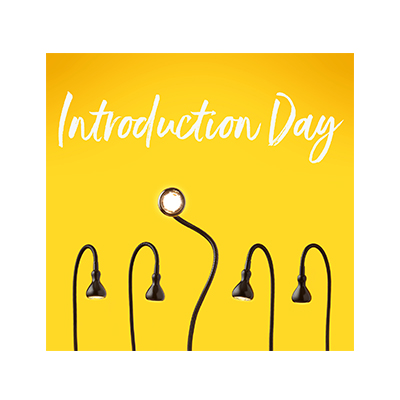‘Trauma is not what happens to you, it’s what happens inside you as a result of what happened to you’. Gabor Maté
 Life can be hard, but I now know for certain that the hardest thing is to go through life holding onto all your traumas. Trauma can literally feel like your soul has been robbed of its power. When I came across Hoffman I was in my 40s, working in London as a business manager in educational recruitment. Despite my outward success, happiness and track record of achievement, I felt empty, disconnected and numb. I was full of anger and resentment towards everything that had happened to me. I was a master of cutting people out of my life. Being cold, shutdown and withdrawn were my armour – a shield I used to navigate life. I attracted unavailable or unsuitable men and my friends were baffled by some of my choices.
Life can be hard, but I now know for certain that the hardest thing is to go through life holding onto all your traumas. Trauma can literally feel like your soul has been robbed of its power. When I came across Hoffman I was in my 40s, working in London as a business manager in educational recruitment. Despite my outward success, happiness and track record of achievement, I felt empty, disconnected and numb. I was full of anger and resentment towards everything that had happened to me. I was a master of cutting people out of my life. Being cold, shutdown and withdrawn were my armour – a shield I used to navigate life. I attracted unavailable or unsuitable men and my friends were baffled by some of my choices.
My life hasn’t always been as clear to me as it is now. It’s been shaped by war, immigration and physical and emotional abuse. My mother was living in Lebanon when war broke out in the 70s and her brothers were actively involved trying to defend their country. My grandparents were in despair, trying to find ways to protect their children. As a result both my uncle and mother, then aged 14, were given into arranged marriages based in Australia. My mother felt a painful push and pull between a sense of rejection at being given away and abandoned by her family alongside the longing to be closer to her parents. That marriage wasn’t smooth sailing for my mother who decided to return to her home country, where she was pushed into another arranged marriage with the man who would be my father. They settled in Kuwait where my brother was born. I arrived in the world eighteen months later, during a family visit to Australia – that timing was to determine my future, if I’d only known it at the time.
 At the age of four, life took an unexpected turn when my mother decided to separate from my father. This started a long and painful road filled with hurt, stepfathers, moving from one country to another, physical and emotional abuse and being forced to separate from my mother and brother for some time. Added to that, I had to deal with war at the age of 10 during the Iraqi invasion of Kuwait.
At the age of four, life took an unexpected turn when my mother decided to separate from my father. This started a long and painful road filled with hurt, stepfathers, moving from one country to another, physical and emotional abuse and being forced to separate from my mother and brother for some time. Added to that, I had to deal with war at the age of 10 during the Iraqi invasion of Kuwait.
A turning point came when I was 17 and had finished secondary school. It began as a trivial argument with my stepdad which meant that I left home to stay with my aunt and then a best friend. During a conversation with my mother, I had a brainwave. I realised I had an Australian passport, and this was my opportunity to break the cycle. I secured a spot at the University of Canberra where I qualified as a primary school teacher. It was only during a course module on how to spot abused children in our care that I realised my own childhood hadn’t been normal.
The older I became, the further apart I grew from my mother. Once I hit 30, I made another big decision. My mother wanted me to go back to live with her in Kuwait. She missed me terribly. She’d found great solace in religion and was in a much more stable place. However, I believed I needed to succeed in the world to prove a point. I was determined that I would earn plenty of money so I could control my own destiny. I felt I could never ask my family for help, as that would be seen as a sign of weakness and defeat. I decided to move to London where I spent my 30s climbing the corporate ladder, becoming a top achiever and basking in success and money. Outside work, I partied hard and wanted to always be the last one standing at every event – to be the popular one. On reflection, I realise my actions were fuelled by rebellious energy. A part of me just wanted my mum to approve of my choices and to be proud of the person I’d become.
I was aware that all was not well behind the façade, but I didn’t see the value in therapy and I was terrified that I’d remember things from my childhood that I’d blocked. What if things came up that were more painful than the ones I recalled? So I began a journey of self-discovery in the safety of my room. Using breathwork and meditation and recorded affirmations, I began to feel somewhat calmer – it was time to face my fears. In 2021 I decided to do Rapid Transformational Therapy. It was the first time I’d spoken to a therapist and something inside me began to shift – the only way to describe it would be that I was returning home to myself.
Shortly after this, a new flatmate called Matt moved in who had done the Process and I discovered an old friend had also done it – she’d even trained to become a Hoffman facilitator. After hearing their experiences, I signed up. Given my background, Hoffman asked me to attend individual therapy sessions with an EMDR (Eye Movement Desensitization and Reprocessing) specialist who was familiar with the Process, before I did the course. This helped to regulate my nervous system and to prepare me for the week to come.
 The best advice my flatmate Matt gave me was to remember that the Process wasn’t a social event and I wasn’t going there to make friends; I needed to focus on myself. I threw myself fully into the course and found an immense love for my inner child, giving her all the love and protection that she’d needed so badly, so she could finally feel safe. When we did the cathartic release work, bashing our negative patterns with a baseball bat, I discovered so much buried anger and resentment. It was time for my inner child to have her voice back. The euphoria as I acknowledged that and let go of what I was holding onto was immense.
The best advice my flatmate Matt gave me was to remember that the Process wasn’t a social event and I wasn’t going there to make friends; I needed to focus on myself. I threw myself fully into the course and found an immense love for my inner child, giving her all the love and protection that she’d needed so badly, so she could finally feel safe. When we did the cathartic release work, bashing our negative patterns with a baseball bat, I discovered so much buried anger and resentment. It was time for my inner child to have her voice back. The euphoria as I acknowledged that and let go of what I was holding onto was immense.
Later in the course where we found compassion and forgiveness, I managed to forgive my stepfather for all that he had done and it set me free. When we connected to the children that our parents once were, it made me curious to understand more of what they had experienced when they were young. So after leaving the Process I rang my mother and asked about her experiences. She’d never had anybody ask her about it before and was moved to share what had happened to her. We met up in Jordan, halfway between us, and had a loving reconnection. Now we speak every day and we’re each other’s greatest supporters.
Leaving the Process, I felt a peace and calmness I’d never felt before – a kind of eternal happiness, even when I was still. I was consumed by a feeling of acceptance of my past and an excitement for the present moment and the future.
I was fortunate that I had a long break from work after the Process, so I was able to practice the Process tools every day. By the time I went back to work, my colleagues all commented on how much calmer, more positive and less reactive I was. I became a magnet for people wanting to share and offload, so I applied to be the Head of Wellbeing in the company. I shared my knowledge of breathwork and meditation and trained in a somatic release therapy called Neo Emotional Release, alongside qualifying as a Conscious Connected Breathwork Teacher and Coach.
 Finally in October 2022 I left my job of 9 years to set up We The Conscious that focuses on conscious living, with breathwork as the main healing modality. Through events, workshops and programmes it encourages you to harness the power of breathwork to clear your mind, let go of limiting beliefs, process emotions and find your inner flow. My aim is to facilitate a lifestyle where we’re more conscious of our actions and reactions to the world we live in.
Finally in October 2022 I left my job of 9 years to set up We The Conscious that focuses on conscious living, with breathwork as the main healing modality. Through events, workshops and programmes it encourages you to harness the power of breathwork to clear your mind, let go of limiting beliefs, process emotions and find your inner flow. My aim is to facilitate a lifestyle where we’re more conscious of our actions and reactions to the world we live in.
And men? Well since the Process, I’ve met someone who’s compassionate to his parents, who shares my love of breathwork, has had therapy and is considering doing the Process. That’s certainly a welcome change.
Now I truly understand that everybody wants to love and be loved and that’s all my mother was searching for all these years. My courage, resilience and other great qualities, are ones I have inherited and learnt from her. To my mother, thank you for all you’ve done, for what you sacrificed and for your pain. She’s my hero, a true survivor with resilience like no other. I’m finally proud of who I am and grateful that both her and my dad chose me. My wounds will always live inside me, they haven’t magically vanished. Today I’ve learnt to love every single one of them and honour my journey and the path I’ve walked to reach to this moment.
The Hoffman Process … The greatest gift to myself.
 We The Conscious: Liza’s Top Tips
We The Conscious: Liza’s Top Tips
- Breathe – Remember your breath is always with you. The word ‘spirit’ derives from the word ‘breath’. Whenever you feel stressed or stuck, take a few deep breaths and count to 5. It helps to regulate your nervous system.
- Spend time away from your phone
- Get into nature as often as you can
- Your mind loves to create stories, so use your breath as an anchor to stay present
- Name 10 things you’re grateful for each day
If you’re looking for ways to explore somatic healing and release through cathartic expression, give Conscious Connected Breathwork a try. An incredible modality to tap into stored and unprocessed emotions, regulate your nervous system and bring you a great sense of calmness and peace.
To learn more about Conscious Connected Breathwork, visit: wetheconscious.studio and follow Liza on Instagram: wetheconscious.studio






 Sign up to receive monthly newsletters from Hoffman
Sign up to receive monthly newsletters from Hoffman